
The Diploma is the ideal way to develop and demonstrate your expertise in International Financial Reporting Standards (IFRS) and enable you to apply the standards accurately and appropriately. It gives you everything you need to know about IFRS.
Exercises, scenarios, action plans and self-study assignments make the CPA Diploma in IFRS Financial Reporting the most engaging and learner-friendly programme available.
In this qualification
Requirements
Examine the requirements of IFRS on a Standard-by-Standard basis
Guidance
Provide guidance on how to use IFRS in practice
Reports
Apply relevant Standards to key elements of financial reports
Disclosures
Identify and apply disclosure requirements
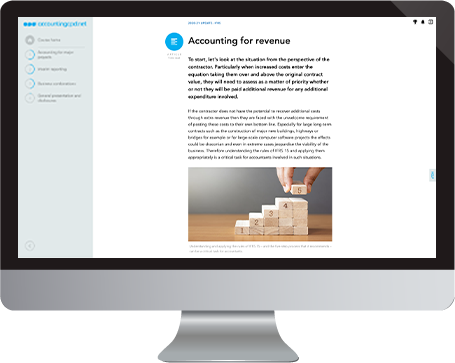
Learning resources
Work through the series of articles, case studies, quizzes, discussions, and more, to develop your understanding and skills.
Expert interviews
Find out what IFRS looks like in the real world with our in-depth video interviews with our IFRS expert, Wayne Bartlett.
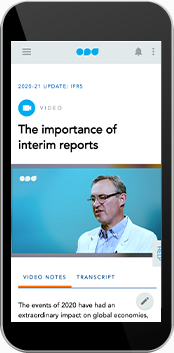
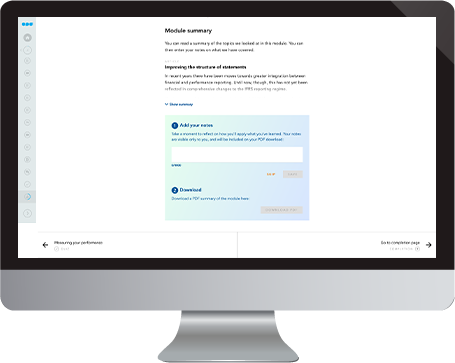
Action plan
Note any changes you wish to make going forwards, in order to apply your new knowledge in your professional role.
Assessment
Once you are ready, you can take the online assessment to demonstrate what you've learned, and complete the qualification
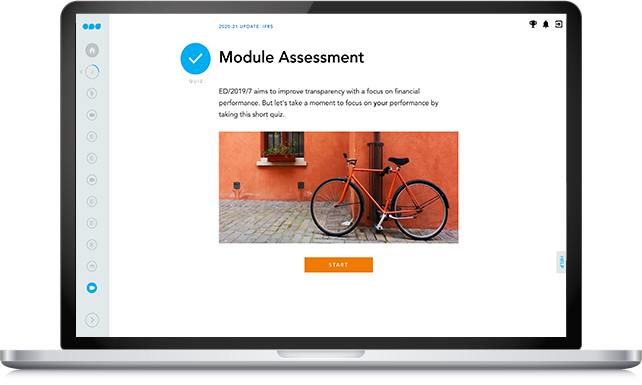
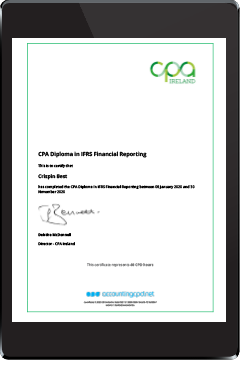
Secure certification
Once you've passed the assessment, you will receive a unique and secure certificate as evidence of your new understanding and capabilities.
The CPA Diploma in IFRS Financial Reporting gives you everything you need to know about IFRS to enable you to apply the Standards accurately and appropriately. The knowledge is presented over nine sections, and concluded with a formal assessment. The Diploma is awarded by CPA Ireland, a founding member of the International Federation of Accountants (IFAC).
-
This section covers the design of financial statements within International Financial Reporting Standards (IFRS), their key components and what each statement is trying to achieve. The topics here make up the core framework of all the IFRSs, and this essential background helps to understand the bigger picture. The elements form part of a comprehensive package, enabling stakeholders to understand the financial position and performance of an entity.
- The aims of IFRS
- General rules
- The statement of financial position
- The statement of comprehensive income
- Other financial statements and disclosure notes
-
Property, Plant and Equipment (PPE) plays a crucial role in the financial statements of many entities. They often make up one of the largest items on the statement of financial position, and also play a big part in the statement of comprehensive income through the charging of depreciation and impairment. This section looks at accounting for PPE through IAS 16, which covers PPE specifically, and IAS 36, which covers the connected issue of impairment.
- Recognition rules
- Depreciation
- PPE disclosures
- Impairments
-
From physical inventories to intangibles most business entities have significant assets other than PPE to account for. This section brings together the accounting, reporting and disclosure requirements for these important non-financial assets under the IFRS regime.
- Inventories
- Intangible assets
- Leasing
- Borrowing costs
- Investment properties
-
Revenue is a fundamental concept in accounting, but the rules for how to recognise and report it in financial statements were fundamentally revised in IFRS 15 Revenue from Contracts with Customers. This section will get you up-to-date with recent changes and what they mean for your organisation.
- IFRS 15: A new Standard
- Step 1: Contract recognition
- Step 2: Identify performance obligations
- Step 3: Determine transaction price
- Step 4: Link price to performance
- Step 5: Recognise revenue
- Contract costs
- Disclosure requirements
- Government grants and assistance
-
The treatment of financial instruments can sometimes be very complex, and it is necessary to have a clear understanding of the rules involved within the IFRSs to apply them properly. Getting this wrong could have a big impact on the financial statements.
- Financial instruments: An overview
- Presentation
- IFRS 9: How we got here
- Hedge accounting
- Financial instruments disclosures
-
Expenditure accounts for half of the overall profitability position for organisations, so accounting for its impact is a key part of performance measurement. This section looks at some of the International Financial Reporting Standards (IFRSs) that affect the "bottom line” through expenditure. It looks at accounting for provisions and contingencies, employee benefits, retirement benefit plans, and income tax, all crucial impactors on expenditure, and therefore profitability.
- Provisions
- Employee benefits
- Retirement benefit plans
- Income taxes
-
Business combinations are a momentous occasion for many organisations. When an entity takes over, or merges with, another business, it has a huge impact on a whole range of issues - not least preparing and presenting the financial statements. This section therefore looks at the various accounting and reporting requirements for business combinations, as set out by the relevant IFRS standards.
- Business combinations
- Separate and consolidated financial statements
- Joint arrangements, associates and joint ventures
- Interests in other entities
-
This is a broad section, dipping into various elements of the IFRS framework in order to present a full image of well-written financial statements. It deals with the IFRS framework practically, and aims to translate each Standard in a way that directly helps us write statements. We begin with IAS 8, which provides general rules that relate to every statement we will write, before addressing Standards that confront specific - yet common - cases.
- Changes in policies
- Foreign exchange
- Events after the reporting date
- Related parties
- Fair value
- Other types of reporting
-
This section covers four IFRSs that are somewhat specific to particular sectors. The Standards on agriculture, exploration and evaluation of mineral resources, and insurance should be self-evident, while that on regulatory deferral accounts concerns how to account for goods and services when rates are fixed by regulation.
- Agriculture
- Mineral resources
- Insurance contracts
- Regulatory deferral accounts
-
Completing all the modules will unlock the assessment. You will only have two attempts to pass the assessment, so take this time to make sure you have revised properly and are well prepared!

Wayne Bartlett
Dr Wayne Bartlett specialises in public sector financial management and budgeting and has worked as a consultant and lecturer throughout the world. After 7 years in the NHS in the UK, he joined the Home Office as Head of Accountancy Advice. He has worked closely with a number of Supreme Audit Institutions and has become an expert of the implementation of international accounting standards.